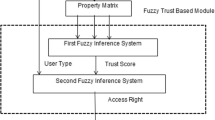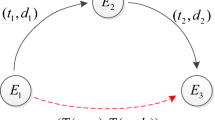Abstract
Large-scale mobile social networks (MSNs) facilitate communications through mobile devices. The users of these networks can use mobile devices to access, share and distribute information. With the increasing number of users on social networks, the large volume of shared information and its propagation has created challenges for users. One of these challenges is whether users can trust one another. Trust can play an important role in users’ decision making in social networks, so that, most people share their information based on their trust on others, or make decisions by relying on information provided by other users. However, considering the subjective and perceptive nature of the concept of trust, the mapping of trust in a computational model is one of the important issues in computing systems of social networks. Moreover, in social networks, various communities may exist regarding the relationships between users. These connections and communities can affect trust among users and its complexity. In this paper, using user characteristics on social networks, a fuzzy clustering method is proposed and the trust between users in a cluster is computed using a computational model. Moreover, through the processes of combination, transition and aggregation of trust, the trust value is calculated between users who are not directly connected. Results show the high performance of the proposed trust inference method.
Similar content being viewed by others
Explore related subjects
Discover the latest articles, news and stories from top researchers in related subjects.References
B. Chang, T. Xu, Q. Liu, E. H. Chen. Study on information diffusion analysis in social networks and its applications. International Journal of Automation and Computing, vol.15, no.4, pp.377–401, 2018. DOI: 10.1007/s11633-018-1124-0.
F. Hao, G. Y. Min, M. Lin, C. Q. Luo, L. T. Yang. Mobi-FuzzyTrust: An efficient fuzzy trust inference mechanism in mobile social networks. IEEE Transactions on Parallel and Distributed Systems, vol.25, no. 11, pp.2944–2955, 2013. DOI: 10.1109/TPDS.2013.309.
W. J. Jiang, G. J. Wang, J. Wu. Generating trusted graphs for trust evaluation in online social networks. Future Generation Computer Systems, vol.31, pp.48–58, 2014. DOI: 10.1016/j.future.2012.06.010.
M. Tavakolifard. On some Challenges for Online Trust and Reputation Systems, Ph. D. dissertation, Norges Teknisk-Naturvitenskapelige Universitet, Norway, 2012.
U. Can, B. Alatas. A new direction in social network analysis: Online social network analysis problems and applications. Physica A: Statistical Mechanics and its Applications, vol.535, Article number 122372, 2019. DOI: 10. 1016/j.physa.2019.122372.
J. Golbeck. Trust on the World Wide Web: A survey. Foundations and Trends® in Web Science, vol.1, no. 2, pp. 131–197, 2006. DOI: 10.1561/1800000006.
W. Sherchan, S. Nepal, C. Paris. A survey of trust in social networks. ACM Computing Surveys, vol.45, no.4, Article number 47, 2013. DOI: 10.1145/2501654.2501661.
S. P. Marsh. Formalising Trust as A Computational Concept, Ph. D. dissertation, University of Stirling, UK, 1994.
B. A. Huberman, D. M. Romero, F. Wu. Social networks that matter: Twitter under the microscope, [Online], Available: https://papers.ssrn.com/sol3/papers.cfm7ab-stract_id=1313405, December 5, 2008.
P. Zhang, A. Durresi. Trust management framework for social networks. I. Proceedings of IEEE International Conference on Communications, IEEE, Ottawa, Canada, pp. 1042–1047, 2012. DOI: 10.1109/ICC.2012.6364031.
E. Dumbill. XML Watch: Finding friends with XML and RDF. IBM Developers Works, 2002.
S. H. Chen, G. J. Wang, W. J. Jia. fe-FuzzyTrust: Efficient trust computation for large-scale mobile social networks using a fuzzy implicit social graph. Information Sci-ences, vol.318, pp. 123–143, 2015. DOI: 10.1016/j.ins.2014. 09.058.
F. A. Parand, F. Matinfar, F. Mehdikhanloo. A new approach for trust computing in mobile social networks. New Media Studies, vol. 5, pp. 31–62, 2019.
C. L. Cheng, X. L. Xu, B. Z. Gao. METrust: A mutual evaluation-based trust model for P2P networks. International Journal of Automation and Computing, vol. 9, no. 1, pp. 63–71, 2012. DOI: 10.1007/s11633-012-0617-5.
W. J. Fan, S. L. Yang, H. Perros, J. Pei. A multi-dimensional trust-aware cloud service selection mechanism based on evidential reasoning approach. International Journal of Automation and Computing, vol.12, no. 2, pp. 208–219, 2015. DOI: 10.1007/s11633-014-0840-3.
N. H. Aghdam, M. Ashtiani, M. A. Azgomi. An uncer-tainty-aware computational trust model considering the co-existence of trust and distrust in social networks. In-formation Sciences, vol.513, pp. 465–503, 2020. DOI: 10.1016/j.ins.2019.10.067.
A. Calio, A. Tagarelli. Complex influence propagation based on trust-aware dynamic linear threshold models. Applied Network Science, vol.4, Article number 14, 2019. DOI: 10.1007/s41109-019-0124-5.
A. Altaf, H. Abbas, F. Iqbal, A. Derhab. Trust models of internet of smart things: A survey, open issues, future directions. Journal of Network and Computer Applications, vol.137, pp. 93–111, 2019. DOI: 10.1016/j.jnca.2019. 02.024.
B. Veloso, F. Leal, B. Malheiro, F. Moreira. Distributed trust & reputation models using blockchain technologies for tourism crowdsourcing platforms. Procedia Computer Science, vol.160, pp. 457–560, 2019. DOI: 10.1016/j.procs. 2019.11.065.
P. Massa. A survey of trust use and modeling in real online systems. Examining the Concepts, Issues, and Implications of Internet Trolling, J. Bishop, Ed., USA: IGI Global, pp. 51–83, 2007. DOI: 10.4018/978-1-4666-2803-8.ch012.
S. Ruohomaa, L. Kutvonen. Trust management survey. I. Proceedings of the 3rd International Conference on Trust Management, IEEE, Berlin, Germany, pp. 77–92, 2005. DOI: 10.1007/114297606.
K. Hoffman, D. Zage, C. Nita-Rotaru. A survey of attack and defense techniques for reputation systems. ACM Com-puting Surveys, vol.42, no. 1, pp. 1–31, 2009. DOI: 10.1145/ 1592451.1592452.
Y. F. Ruan, A. Durresi. A trust management framework for clouds. Computer Communications, vol. 144, pp. 124–131, 2019. DOI: 10.1016/j.comcom.2019.05.018.
Y. F. Ruan, A. Durresi. A survey of trust management sys-tems for online social communities - Trust modeling, trust inference and attacks. Knowledge-Based Systems, vol. 106, pp. 150–163, 2016. DOI: 10.1016/j.knosys.2016.05.042.
A. Abdul-Rahman, S. Hailes. Supporting trust in virtual communities. I. Proceedings of the 33rd Annual Hawaii International Conference on System Sciences, IEEE, Maui, USA, Article number 9, 2000. DOI: 10.1109/HICSS.2000. 926814.
S. D. Kamvar, M. T. Schlosser, H. Garcia-Molina. The eigentrust algorithm for reputation management in P2P networks. I. Proceedings of the 12th International Conference on World Wide Web, ACM, New York, USA, pp. 640–651, 2003. DOI: 10.1145/775152.775242.
C. N. Ziegler, J. Golbeck. Investigating interactions of trust and interest similarity. Decision Support Systems, vol.43, no. 2, pp.460–475, 2007. DOI: 10.1016/j.dss.2006.11.003.
H. Ma, Z. G. Hu. Cloud service recommendation based on trust measurement using ternary interval numbers. I. Proceedings of International Conference on Smart Com-puting, IEEE, Hong Kong, China, pp. 21–24, 2014. DOI: 10.1109/SMARTCOMP.2014.7043834.
P. C. Wei, F. C. He. Research on security trust measure model based on fuzzy mathematics. Chaos, Solitons & Fractals, vol. 128, pp. 139–143, 2019. DOI: 10.1016/j.chaos.2019.05.034.
Y. L. Sun, W. Yu, Z. Han, K. J. R. Liu. Information theoretic framework of trust modeling and evaluation for ad hoc networks. IEEE Journal on Selected Areas in Communications, vol.24, no. 2, pp.305–317, 2006. DOI: 10.1109/JSAC. 2005.861389.
H. Fang, G. B. Guo, J. Zhang. Multi-faceted trust and distrust prediction for recommender systems. Decision Support Systems, vol.71, pp.37–47, 2015. DOI: 10.1016/j.dss.2015.01.005.
B. D. O. Anderson, M. B. Ye. Recent advances in the mod-elling and analysis of opinion dynamics on influence networks. International Journal of Automation and Comput-ing, vol.16, no.2, pp. 129–149, 2019. DOI: 10.1007/s11633-019-1169-8.
H. B. Zhang, Y. Wang, X. Z. Zhang, E. P. Lim. Reputa-tionPro: The efficient approaches to contextual transaction trust computation in E-commerce environments. ACM Transactions on the Web, vol.9, no. 1, Article number 2, 2015. DOI: 10.1145/2697390.
X. M. Zheng, Y. Wang, M. A. Orgun, G. F. Liu, H. B. Zhang. Social context-aware trust prediction in social networks. I. Proceedings of the 12th International Conference on Service-Oriented Computing, Springer, Paris, France, pp. 527–534, 2014. DOI: 10.1007/978-3-662-45391-9_45.
D. Gambetta. Trust: Making and Breaking Cooperative Relations, New York, USA: Basil Blackwell, 1988.
G. C. Liu, Q. Yang, H. G. Wang, X. D. Lin, M. P. Wittie. Assessment of multihop interpersonal trust in social net-works by three-valued subjective logic. I. Proceedings of IEEE Conference on Computer Communications, IEEE, Toronto, Canada, pp. 1698–1706, 2014. DOI: 10.1109/IN-FOCOM.2014.6848107.
S. Ries. Certain trust: A trust model for users and agents. I. Proceedings of ACM Symposium on Applied Comput-ing, ACM, Seoul, Korea, pp. 1599–1604, 2007. DOI: 10.1145/1244002.1244342.
J. Golbeck. Trust and nuanced profile similarity in online social networks. ACM Transactions on the Web, vol.3, no.4, Article number 12, 2009. DOI: 10.1145/1594173.1594174.
Q. Shambour, J. Lu. A trust-semantic fusion-based recom-mendation approach for e-business applications. Decision Support Systems, vol.54, no. 1, pp.768–780, 2012. DOI: 10.1016/j.dss.2012.09.005.
E. Golzardi, A. Sheikhahmadi, A. Abdollahpouri. Detection of trust links on social networks using dynamic features. Physica A: Statistical Mechanics and its Applications, vol.527, Article number 121269, 2019. DOI: 10.1016/j.physa.2019.121269.
X. Y. Guo, Q. Guo, R. D. Li, J. G. Liu. Long-term memory of rating behaviors for the online trust formation. Physica A: Statistical Mechanics and its Applications, vol. 508, pp. 254–264, 2018. DOI: 10.1016/j.physa.2018.05.106.
L. J. Chen, J. Gao. A trust-based recommendation method using network diffusion processes. Physica A: Statistical Mechanics and its Applications, vol.506, pp.679–691, 2018. DOI: 10.1016/j.physa.2018.04.089.
G. J. Wang, W. J. Jiang, J. Wu, Z. L. Xiong. Fine-grained feature-based social influence evaluation in online social networks. IEEE Transactions on Parallel and Distributed Systems, vol.25, no.9, pp.2286–2296, 2014. DOI: 10.1109/ TPDS.2013.135.
M. Kim, S. O. Park. Group affinity based social trust model for an intelligent movie recommender system. Multime-dia Tools and Applications, vol.64, no.2, pp.505–516, 2013. DOI: 10.1007/s11042-011-0897-8.
M. Kim, J. Seo, S. Noh, S. Y. Han. Identity management-based social trust model for mediating information sharing and privacy enhancement. Security and Communication Networks, vol.5, no.8, pp.887–897, 2012. DOI: 10.1002/sec.379.
G. J. Wang, J. Wu. Multi-dimensional evidence-based trust management with multi-trusted paths. Future Generation Computer Systems, vol.27, no.5, pp.529–538, 2011. DOI: 10.1016/j.future.2010.04.015.
R. Falcone, G. Pezzulo, C. Castelfranchi. A fuzzy approach to a belief-based trust computation. I. Proceedings of AAMAS International Workshop on Trust, Reputation, and Security: Theories and Practice, Springer, Bologna, Italy, pp. 73–86, 2003. DOI: 10.1007/3-540-36609-17.
V. Kant, K. K. Bharadwaj. Fuzzy computational models of trust and distrust for enhanced recommendations. International Journal of Intelligent Systems, vol.28, no.4, pp. 332–365, 2013. DOI: 10.1002/int.21579.
J. M. Blin. Fuzzy relations in group decision theory. Journal of Cybernetics, vol.4, no. 2, pp. 17–22, 1974. DOI: 10.1080/01969727408546063.
L. A. Zadeh. Similarity relations and fuzzy orderings. Information Sciences, vol.3, no.2, pp. 177–200, 1971. DOI: 10.1016/S0020-0255(71)80005-1.
E. H. Erikson. Childhood and Society. London, UK: W.W.Norton & Company, 1975.
E. H. Erikson. Childhood and Society. London, UK: W.W.Norton & Company, 1993.
J. D. Lewis, A. Weigert. Trust as a social reality. Social Forces, vol.63, no.4, pp.967–985, 1985. DOI: 10.2307/ 2578601.
Acknowledgments
This work was supported by the Allameh Tabataba’i University. The anonymous people who helped us to perform the empirical study are appreciated. Specially, Miss Mehdikhanloo is appreciated for providing the Saadi dataset.
Author information
Authors and Affiliations
Corresponding author
Additional information
Farzam Matinfar received the B.Eng., M.Eng. and Ph.D. degrees in computer engineering from Isfahan University, Iran in 2004, 2008, and 2014 respectively. He is an assistant professor at Allameh Tabataba’i University, Iran. His research interests include semantic web and social networks.
Rights and permissions
About this article
Cite this article
Matinfar, F. A Computational Model for Measuring Trust in Mobile Social Networks Using Fuzzy Logic. Int. J. Autom. Comput. 17, 812–821 (2020). https://doi.org/10.1007/s11633-020-1232-5
Received:
Accepted:
Published:
Issue Date:
DOI: https://doi.org/10.1007/s11633-020-1232-5




